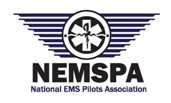Fri, Jan 14, 2011
Association Supports Many Changes, But Offers Suggestions On
Key Points
 The National EMS Pilots Association has submitted a 22-page
position paper on the FAA Notice of Proposed Rule Making pertaining
to helicopter air ambulance operations.
The National EMS Pilots Association has submitted a 22-page
position paper on the FAA Notice of Proposed Rule Making pertaining
to helicopter air ambulance operations.
January 10 was the deadline for the public submission of
comments on the proposed changes to FAR Part 135. The new rules, if
implemented as proposed without modification, will be the most far
reaching changes to Part 135 of the FARs in recent history. The
FAA’s proposal includes provisions that apply specifically to
helicopter air ambulance operations, as well as rules that will
affect all commercial helicopter operations.
NEMSPA’s comments on the proposed rules express support of
much of the contents, but take issue with several elements of the
proposal that the officers of the EMS pilots’ organization
feel will have unintended consequences that could hinder the
ability of the air medical transport industry to provide
the life-saving services that our national system of healthcare
facilities has come to rely upon.
 The organization said in its comments that it believes that
"the FAA should not mandate HTAWS in lieu of other proven
technologies to include NVIS (NVG). It is our opinion that the
current NPRM is somewhat myopic to the benefits of other
technologies available to industry such as NVIS. Although the FAA
proposes a rule that includes NVIS for weather reduction minima, no
recommendation for NVIS utilization is given." They suggest
alternate language that would mandate the use of NVG technology,
which the association says is proven. The language would also
"strongly encourage" HTAWS installation.
The organization said in its comments that it believes that
"the FAA should not mandate HTAWS in lieu of other proven
technologies to include NVIS (NVG). It is our opinion that the
current NPRM is somewhat myopic to the benefits of other
technologies available to industry such as NVIS. Although the FAA
proposes a rule that includes NVIS for weather reduction minima, no
recommendation for NVIS utilization is given." They suggest
alternate language that would mandate the use of NVG technology,
which the association says is proven. The language would also
"strongly encourage" HTAWS installation.
The NPRM also calls for all helicopter pilots to "be required to
demonstrate recovery from an inadvertent IMC encounter and
understand procedures for aircraft handling in flat-light,
whiteout, and brownout conditions. Pilot required to demonstrate
realistic course of action that he or she might take to escape from
inadvertent IMC during a competency check." In its responses, the
NEMSPA said it had conducted an informal survey showing that "more
than 80% of respondents had not conducted a patient transport under
instrument flight rules during the previous 12 months. An
additional 9% reported that less than 5% of patient transport
flights were flown under instrument flight rules. Only 1 pilot
(0.2%) had flown more than 50% of patient transports under
instrument flight rules." It also found that nearly 70% had not
flown in actual IMC conditions during the previous 12 months. The
association recommended that "the 'preparation for an annual
competency check' be strengthened through recent experience
requirements, recommending that helicopter EMS pilots obtain a
minimum of 5.0 hours of simulated or actual instrument time, either
in an aircraft or flight simulator, every 12 calendar months.
The National EMS Pilots Association is a non-profit professional
pilot organization dedicated to serving rotary wing and fixed wing
pilots involved in the air-medical transport industry.
More News
Aero Linx: International Federation of Airworthiness (IFA) We aim to be the most internationally respected independent authority on the subject of Airworthiness. IFA uniquely combi>[...]
Ultrahigh Frequency (UHF) The frequency band between 300 and 3,000 MHz. The bank of radio frequencies used for military air/ground voice communications. In some instances this may >[...]
A Few Questions AND Answers To Help You Get MORE Out of ANN! 1) I forgot my password. How do I find it? 1) Easy... click here and give us your e-mail address--we'll send it to you >[...]
From 2019 (YouTube Edition): Learning To Paint Without Getting Any On Your Hands PPG's Aerospace Coatings Academy is a tool designed to teach everything one needs to know about all>[...]
Also: Sustainable Aircraft Test Put Aside, More Falcon 9 Ops, Wyoming ANG Rescue, Oreo Cookie Into Orbit Joby Aviation has reason to celebrate, recently completing its first full t>[...]
 ANN's Daily Aero-Linx (05.06.25)
ANN's Daily Aero-Linx (05.06.25) ANN's Daily Aero-Term (05.06.25): Ultrahigh Frequency (UHF)
ANN's Daily Aero-Term (05.06.25): Ultrahigh Frequency (UHF) ANN FAQ: Q&A 101
ANN FAQ: Q&A 101 Classic Aero-TV: Virtual Reality Painting--PPG Leverages Technology for Training
Classic Aero-TV: Virtual Reality Painting--PPG Leverages Technology for Training Airborne 05.02.25: Joby Crewed Milestone, Diamond Club, Canadian Pilot Insurance
Airborne 05.02.25: Joby Crewed Milestone, Diamond Club, Canadian Pilot Insurance




